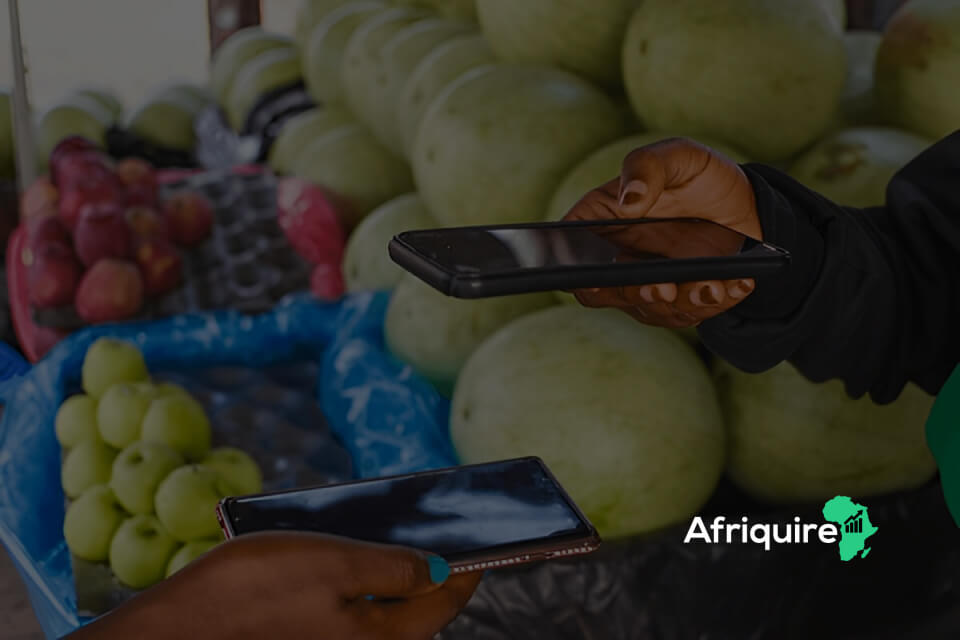Introduction
The impact of digital payments on African agribusinesses can be seen in how the face of farming and agriculture has been transformed across the continent. Farming is very central in Africa’s economy, and digital payment solutions ease the transaction process of getting money for their products and services. This is because farmers need quick payments in order for them to continue their work. With the agribusiness sector projected to reach $1 trillion by 2030, there is every reason why one needs to understand how digital payments will help farmers expand their businesses and improve financial inclusion. Let’s discuss the agribusiness sector, the importance of digital payments, how digital payments can be integrated, and how they relate to Africa’s future.
Overview of the Agribusiness Sector in Africa.
Agribusiness is one of the most important sectors in the African economy. Agriculture contributes between 30% – 40% to Africa’s GDP, especially in Sub-Saharan Africa, and employs over two-thirds of Africa’s workforce. Africa has vast expanses of farmland—about 60% of the world’s unused arable land. This means that Africa can play a big role in food production worldwide.
However, this sector is faced with a lot of challenges. Generally, small-scale farmers have to suffer limited access to finance, old farming methods, and low productivity. Nevertheless, despite all those challenges, people are realising that agribusiness might help grow the economy and improve the lives of many Africans. This shows why it will be important to see how digital payments can make this sector better and more efficient.
Importance of Digital Payments in Transforming Traditional Agricultural Practices.
Operating on cash transactions can be highly risky due to problems such as theft and fraud. Digital payments reduce these risks and help farmers keep their money safe. In addition, digital payments allow farmers to expand their reach by selling to new customers or bigger markets that prefer cashless transactions. In this way, farming will become more organized and productive as more agribusinesses adopt digital payments.
The Role of Financial Inclusion in Supporting Agribusiness Growth.
Financial inclusion plays a critical role in supporting agribusiness growth across Africa. Most farmers, especially smallholder farmers, lack access to banking services. Where there is no bank account, one cannot save or receive money, apply for loans, and invest in better farming techniques.
With digital payments, farmers have better access to financial services. Besides, they can receive money digitally, build credit history, and apply for loans to expand their farms. That is important because access to finance helps not only individual farmers but also the whole value chain of the agribusiness sector.
Benefits of Digital Payments for Agribusinesses
For Farmers and Producers:
- Direct Access to Markets and Buyers.
Digital payments allow farmers and producers to sell their produce directly to consumers. This eliminates the need for middlemen, who often siphon off the largest proportion of the farmers’ profits. With digital payment platforms, farmers are able to reach out to consumers and businesses, commanding better prices for their products. This will not only improve their income but also enable them to get a sense of what the market requires, thereby becoming more successful in their business.
- Quick and Secure Payments.
One of the biggest advantages of digital payments is that they are fast and safe. Farmers can get their money immediately after selling their products. This helps them manage their money better and avoid problems like theft or fraud that come with cash payments. With quick and secure payments, farmers can focus more on growing their business rather than stressing about delays or losses of money.
- Elimination of Middlemen and Associated Costs.
Digital payment solutions help farmers get rid of middlemen in the selling process. Middlemen, on their end, generally take advantage of high commissions, thereby reducing farmers’ profits. By directly receiving the payments, farmers can retain more money. They will, therefore, be in a better position to invest in their farms, higher quality seeds and better tools, or even put something aside for the future. This benefits not only the farm owner himself but also aids in the growth of rural communities.
For Agribusiness Companies:
- Streamlined Financial Transactions.
Digital payments help agribusiness companies process transactions faster. With an automated payment system, it is possible for companies to send and receive money quickly and accurately. This reduces paperwork and allows businesses to focus on more important things like improving their products and expanding their markets.
- Improved Supply Chain Efficiency.
Digital payments reinforce the supply chain through the real-time transaction data this solution offers. This can enable agribusinesses to monitor payments and deliveries more closely, ensuring goods are moved at the right time and in a timely manner from farmers to the markets. Transparency in transactions decreases instances of delays and errors, hence, making business operations effective.
- Enhanced Record-Keeping and Financial Management.
Digital payments facilitate proper recording of the financial books for agribusinesses. Accurate record-keeping is vital for financial management and compliance with regulations. In digital systems, the company knows better about its profit, loss, and cost of operations. This way, companies can plan for the future and follow government regulations easily without much pressure.
For Rural Economies:
- Boosting Economic Activity Through Secure Payment Flows.
Digital payments foster the growth of rural economies through safer and speedier money transactions. When farmers get paid more quickly, they can spend more in their communities. This helps local businesses thrive and creates additional jobs, adding to the overall growth of the economy.
- Encouraging investment in agricultural Innovations.
With the new digital payments, farmers will be able to invest in new farming techniques and technology. When they can access their money with ease, they can buy better seeds, equipment, or even training that helps them increase their production. This is important in making farming more modern and sustainable in Africa.
The impact of digital payments on African agribusinesses is huge. It is changing the way farmers and companies do business. The changes that digital payments create are definitely contributing to growing a stronger agricultural sector in Africa.

Case Studies of Agribusinesses Using Digital Payments
Examples of Successful Integration:
Smallholder Farmers using Mobile Money Services
In Kenya, small farmers have benefited greatly from the use of mobile money services such as M-Pesa. This system allows farmers to receive payments directly in their phones, and conduct fast and easy transactions. For instance, farmers may sell the crops to any market and be paid through the M-Pesa cash directly into his or her hand without being at risk with all that cash money. In addition, direct accessing of such funds allows the farmers to easily get the required improved seeds, fertilizers, and farm equipment in preparation for increased yields. The impact is that through digital payments, African agribusinesses have better financial security and are in a position to expand their businesses with ease.
Partnerships between Agritech Startups and Financial Service Providers.
Many of the agritech startups have partnered with various financial service providers in a bid to help farmers in Africa.
For example, VeryPay partners with mobile money providers to offer digital wallets to farmers. These wallets also enable farmers to pay for seeds, fertilizers, and other farm inputs without having to use cash. Transactions go faster with the use of digital means, which teaches farmers how to handle their money more properly.
The impact brought by digital payment systems on African agribusinesses is huge in creating a stronger and more inclusive financial system for farmers.
Digital Marketplaces for Agricultural Products Leveraging Payment Systems.
Digital marketplaces are emerging as vital platforms for agricultural products in Africa. These platforms connect farmers directly with consumers and businesses, allowing them to sell their products online.
A good example is Twiga Foods in Kenya, where farmers list their produce and get paid digitally. This increases their sales and reduces the chances of not being paid on time. These platforms make transactions more transparent and efficient by using a digital payment system.
The impact of digital payments on African agribusinesses is clear as it empowers farmers to reach wider markets and improve their incomes.
Impact Stories: Increased Productivity, Profitability, and Financial Inclusion.
Many farmers have increased their productivity and profits by using digital payments. With fast and convenient access to cash, they can purchase high-quality seeds and fertilizers that better their yields.
With mobile payments, farmers can invest more in their farms, thus reaping more. Since they are paid on time, they are able to reinvest the profits sooner. This does not only benefit the individual farmer but also gives a boost to the local economies.
The impact of digital payments on African agribusinesses is strong, as more farmers start to see financial security in order to grow their businesses. Farmers should research on how to choose the right digital payment solution and ways to integrate digital payments with African banking systems.
Challenges in Implementing Digital Payments
Digital payments can help farmers in Africa to grow their businesses, yet there are so many issues that make it difficult for them to use the systems. Let’s go into details of some of the biggest challenges and how they would relate to the impact of digital payments on African agribusinesses.
Infrastructure Issues:
Limited Access to Reliable Internet and Mobile Networks in Rural Areas.
Infrastructure is one major problem. Most of the rural areas in Africa do not have a good internet network nor a mobile network. Without an effective network, digital payments might not go through properly, leading to failed transactions or delays. This may be a bit annoying for the farmers who really want their money on time.
Lack of Banking Infrastructure to Support Digital Payments.
Another problem is that banking services are not widely accessible among rural areas. Some farmers may not even have bank accounts; therefore, using a digital payment platform is out of the question. Seriously, without proper infrastructure, the impact of digital payments on African agribusinesses is limited, and many farmers would not be able to benefit from these modern solutions.
Financial Literacy:
Farmers’ Unfamiliarity with Digital Payment Systems.
Farmers also do not correctly understand how the system of digital payments works. Therefore, this incomplete financial knowledge makes farmers suspicious of all digital payment means. Some just prefer cash over other means due to familiarity with it. If they did not understand, they would be unwilling to go into digital systems.
Resistance to Change from Traditional Cash-Based Transactions.
Farmers may resist changing from traditional cash-based transactions because they feel more comfortable with what they know. This resistance can slow down the adoption of digital payments, limiting their potential benefits. To improve this situation, it’s essential to provide training and resources that help farmers understand how to use digital payment solutions effectively.
Regulatory and Policy Barriers:
Inconsistent Regulations Across Countries.
Different countries have varied rules and regulations concerning digital payments in different African countries. This may inconvenience farmers and businesspeople who try to use these systems across borders. For example, a payment method that works in one country may not work in another. This creates confusion and slows down the adoption of digital payments.
High Transaction Fees for Digital Payment Platforms.
Another challenge is high transaction fees. Some of the digital payment platforms have high charges, making it expensive for farmers to use the services. If the cost of using digital payments is too high, many farmers will prefer the use of cash. To enhance the impact of digital payments on African agribusinesses, governments and financial institutions need to create better policies that support farmers.
Trust Issues
Concerns over Data Security and Fraud.
Many farmers are seriously concerned with the probability of fraud and data security with digital payments. They are afraid that their personal information may be stolen or they could lose money because of some kind of fraud. When people do not trust the digital payment systems, they will not use them.
Digital payment companies have to ensure that the platforms they provide are secure and user-friendly to curb this problem. It is also their responsibility to educate farmers on how to safeguard themselves from fraudsters. Once farmers have trust in the digital payment system, then the impacts of digital payments on African agribusinesses will be considered high.
While digital payments could help the African farmer, issues such as infrastructure problems, financial literacy, regulatory barriers, and trust issues need to be resolved. Till then, the benefits will reach a few farmers.

Opportunities for Growth and Development
Expansion of Mobile Money Platforms in Underserved Regions.
The increase in the numbers of mobile money platforms across the unserved regions acts more as an opportunity for Africa. Many of the rural areas are so much out of the reach of banks, and on this count mobile money has acted as a payable alternative. People could send, receive, and save money using phones facilitated by such platforms as M-Pesa. This has made it easier for farmers and small businesses to conduct digital transactions. As mobile money services are extended, they will improve the level of inclusion in the financial space and the impact of digital payments on African agribusinesses. This also contributes to growth and development in rural areas.
Collaboration between Governments, Banks, and Agritech Companies.
There are many reasons why collaboration between governments, banks, and agritech companies is a necessary factor in having agribusinesses grow. Examples include:
- policies the government may be implementing to incentivize the usage of digital payment platforms;
- special services that farmers might receive from the banks, and
- the technology the agritech companies use for the said digital transaction.
Such collaborations will guarantee increasing usage of the digital payment, intensification of digital payment impact on African agribusinesses, and modernizing of farming.
Integration of Digital Payments into Broader Agricultural Value Chains.
Another good opportunity is adding digital payments to every stage of agribusiness. In cases where farmers, suppliers, and buyers use digital transactions, they can work faster and more efficiently. For example, suppliers will be able to get money instantly, which will help them to reinvest in their business as soon as possible. Besides, the usage of digital ways of payments makes transactions more transparent and builds trust. The more agribusinesses use these systems, the stronger will be the impact of digital payments on African agribusinesses.
Leveraging Data from Digital Payment Systems for Better Market Insights.
Digital payment systems generate valuable data that can provide insights into market trends and consumer behaviour. Agribusinesses can use this data to make informed decisions about production and marketing strategies. For example, the farmer will know what type of crops to plant and when to sell by studying the demand of the buyer. This would help to yield maximum profit. By using data analytics tools, agribusinesses can enhance their competitiveness and adapt more quickly to changing market conditions. This ability to leverage data is important for maximizing the impact of digital payments on African agribusinesses.
Potential for Cross-Border Trade Facilitated by Digital Payment Solutions.
Digital payments will facilitate farmers and agribusinesses in cross-border trade. Instead of selling their products in their local market, they are now able to reach international markets with much ease. This might help African farmers expand their businesses and improve their incomes. Digital payment systems eliminating trade barriers will significantly enhance the impact of digital payments on African agribusinesses and spur economic growth within the continent.
The future of African agribusinesses is bright as they seize these opportunities for growth. More farmers and business owners will be able to benefit from the advantages of digital transactions by learning how to choose the right digital payment solution and finding ways to integrate digital payments with African banking systems.
Strategies for Effective Integration
Building Digital Literacy Programs for Farmers and Agribusiness Stakeholders.
Building digital literacy programs is critical for educating farmers and agribusiness stakeholders on how to use digital payment systems successfully. These programs can teach fundamental skills like using mobile payment platforms and handling online transactions. For example, the Women Farmers Programme in South Africa has effectively taught many female farmers in digital skills, allowing them to access markets and enhance their companies. By investing in digital literacy, we can increase the impact of digital payments on African agribusinesses and enable farmers to fully utilize these technologies.
Investing in Rural Infrastructure.
Good access to the internet and mobile network is a prerequisite for using digital payments.
Most farmers in Africa live in areas with very poor network coverage, which makes it hard to use mobile money and other digital payment systems. If more governments and private companies invest in better internet and mobile connectivity, more farmers will be able to connect with buyers and markets. Improvement in rural infrastructure will further enhance the impact of digital payments on African agribusinesses, enabling farmers to grow their businesses at a faster rate.
Offering incentives for Agribusinesses to Adopt Digital Payment Systems.
Most of the agribusinesses would not like to shift to digital payments owing to the costs involved. To encourage them, governments and organisations can offer incentives, such as tax breaks, subsidies for technology purchases, or grants for training programmes. This will make the shift to using digital payments much easier and more affordable for agribusinesses. The more businesses that adopt the system of digital payment, the more will be the impact of digital payments on African agribusinesses, making transactions faster and safer.
Developing Partnerships between Banks, Fintech Companies, and Agritech Startups.
Better financial solutions can be developed for farmers when banks, fintech companies, and agritech startups come together. These partnerships could grant loans to farmers or make it easier for them to save and make digital payments. For instance, banks may create financial products on the basis of fintech platforms to make the handling of digital money easy for farmers. Strengthening these partnerships will enhance the impact of digital payments on African agri-businesses and ensure that farmers and agri-businesses receive the best possible financial inclusion.
Advocating for Supportive Policies and Regulatory Frameworks to Reduce Barriers.
Most farmers and agribusinesses avoid digital payments due to high charges and/or unclear regulations. Governments should develop policies that make digital payments more affordable, secure, and convenient. This includes easing transaction costs, increasing the security of data, as well as assurances on the safety of farmers. When the enabling regulatory environment is fair, more farmers would therefore have confidence to trust digital payments.
Frequently Asked Questions (FAQs)
1. What are digital payments?
Digital payments refer to transactions made electronically that allow users to send and receive money utilizing a device such as a mobile phone or computer.
2. How do digital payments benefit farmers?
Digital payments provide farmers with faster access to funds, help to prevent fraudulent activities, and cut out middlemen so that farmers can retain a larger share of their profits.
3. Are there challenges in adopting digital payments?
Yes, among them are limited internet access in rural areas, financial illiteracy of farmers, and concerns over the security of data. Overcoming these challenges would ensure tapping into the full benefits of digital payments.
4. How do digital payments enable financial inclusion?
Mobile phone banking makes it possible for the unbanked to access the financial mainstream. By doing this, farmers can save money and take out loans.
5. What should I consider when choosing a digital payment solution?
Besides convenience, consider factors such as usability, transaction fee, security measures available, and integration with existing bank systems when selecting a digital payment method. Making the right choice will depend on these factors

Conclusion
In conclusion, the impact of digital payments on African agribusinesses is profound and transformative. Digital payments enable farmers and agribusinesses to thrive in a competitive landscape by improving financial inclusion, increasing market access, and streamlining transactions. As mobile money and digital payment solutions continue to grow, they create opportunities for agricultural productivity and profitability.
With the right strategies in place, digital payments can drive sustainable growth and development for African agriculture, ensuring a brighter future. However, addressing challenges such as infrastructure gaps and financial literacy is crucial for maximizing these benefits.



